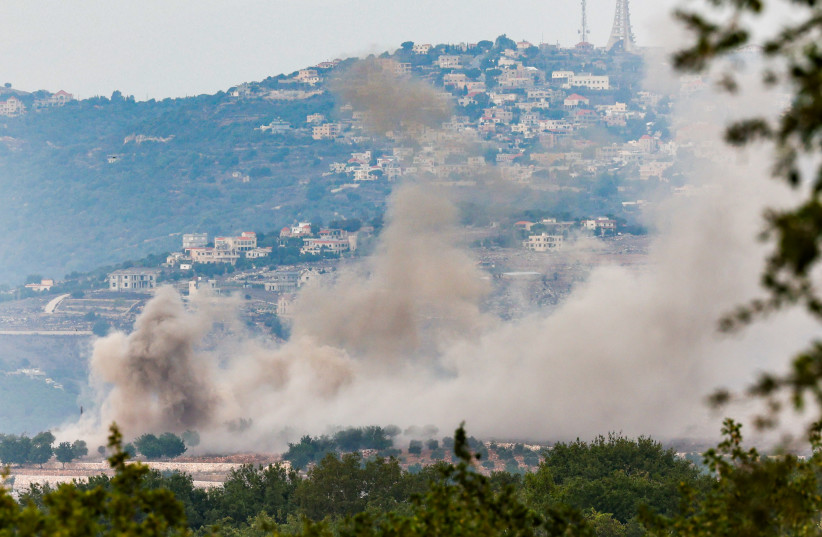A Hezbollah MP warned that Israeli airstrikes that caused widespread damage in the town of Aitaroun near the Israeli-Lebanese border on Sunday were a "new escalation," adding that the terrorist group would continue its attacks on Israel, in a statement to Reuters.
Hassan Fadlallah warned that the terrorist movement would respond to the "escalation" in new ways, be it "in the nature of the weapons [used] or the targeted sites."
Lebanese media portrayed the IDF's response to Hezbollah attacks on Sunday as a significant escalation compared to other clashes along the border in recent weeks.
On Monday morning, at least six rockets were fired from Lebanon toward northern Israel and were intercepted by the Iron Dome, according to the IDF Spokesperson's Unit. The military responded with artillery fire targeting several locations along the Lebanese border.
Additionally, on Monday, Lebanon's Nidaa al-Watan newspaper reported that a gradual escalation had been taking place in recent days, coinciding with a demand by Israel that Hezbollah withdraw to north of the Litani River in Lebanon in accordance with UN Security Council Resolution 1701.

The Nidaa al-Watan report noted that the strike on Aitaroun was the first in which "an entire neighborhood has been destroyed in a southern town," saying that this raised concerns that "the Gaza war model of widespread destruction... is beginning to rear its head on the Lebanese front."
Hezbollah announced on Monday morning that two of the movement's members were killed amid the intensifying clashes—among more than 90 who have been killed since the Lebanese based terrorist group launched attacks on northern Israel on October 8, the day after its fellow terrorist group Hamas perpetrated its Gaza massacre in the South, murdering at least 1,200 people and taking 240 people hostage.
Diplomatic efforts being pursued, military option being prepared
Last week, Defense Minister Yoav Gallant told the leaders of communities near the northern border that Israel was attempting to reach a diplomatic solution in which Hezbollah would retreat to the Litani River, but was also prepared to remove the terrorist group through military means from the area near the border.
On Sunday, KAN news reported that Israel was preparing to set a deadline for a diplomatic solution and that Israeli officials believe the chances of such a solution are low.
During a visit to Israeli forces along the Lebanese border on Sunday, IDF Chief of Staff Lt.-Gen. Herzi Halevi stressed that security needs to be restored to the northern front, and that "there is a military way to do this, the beginning of which is also what you are doing here—to strike, to deter, to kill Hezbollah operatives, to show our superiority—and it can also come in the form of an offensive, an attack and a war.
"The State of Israel has never gone and said war is the first solution we will try," he said, "but we understand that the current situation should end in a very, very clear change."
Ali Damush, the deputy chairman of Hezbollah's Executive Council, rejected statements by Israeli officials saying that the group "will not allow the equations to be changed."
On Sunday, the United Nations Interim Force in Lebanon said that a watchtower inside a UNIFIL position near Ibel Qameh in southern Lebanon was hit by shelling on Saturday afternoon. No injuries were reported in the incident.
"Any targeting of UNIFIL positions and any use of the vicinity of our positions to launch attacks across the Blue Line is unacceptable," the interim force said. "After over two months of active shelling along the Blue Line, the potential for a miscalculation that could trigger a wider conflict is increasing."
